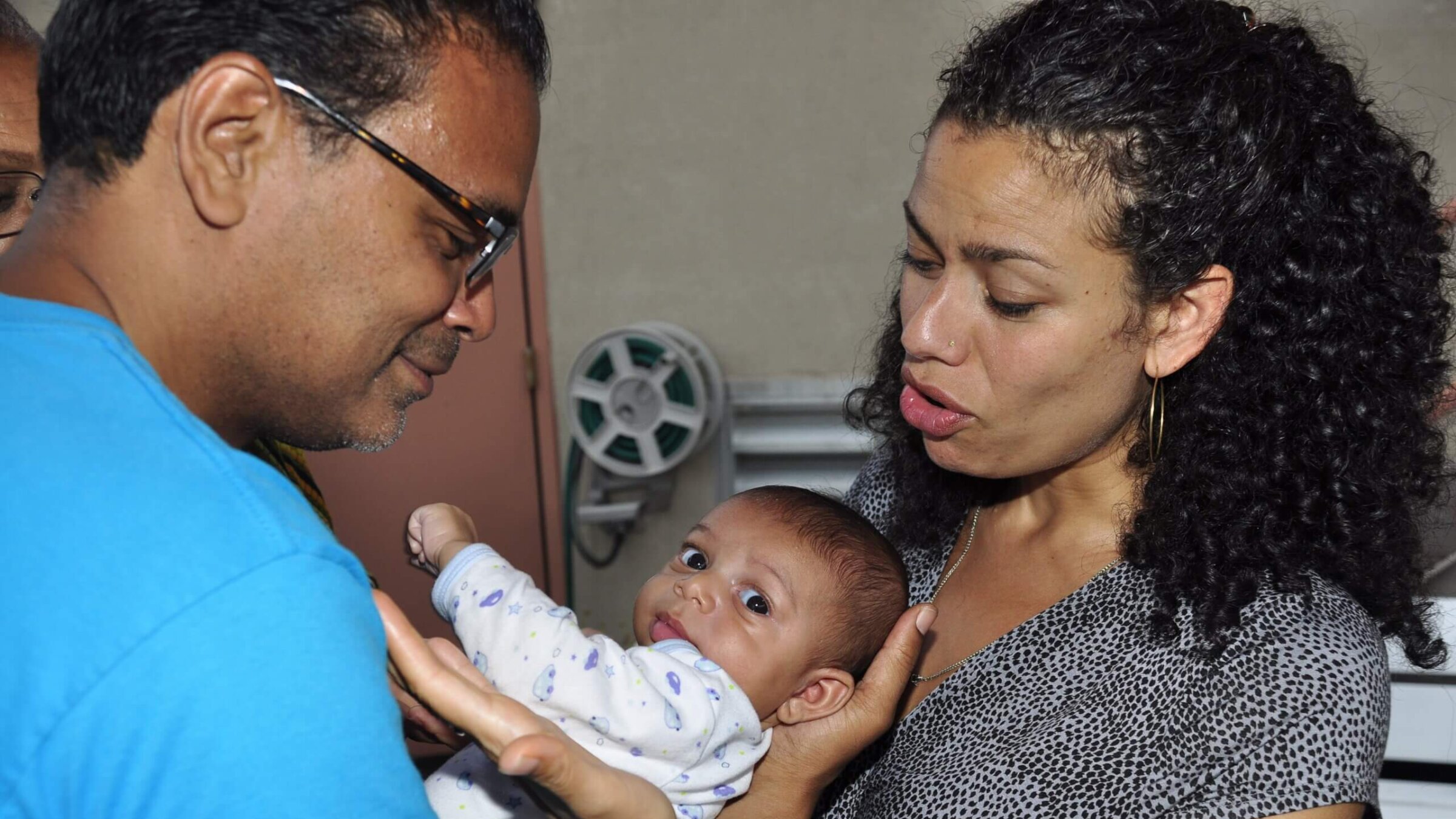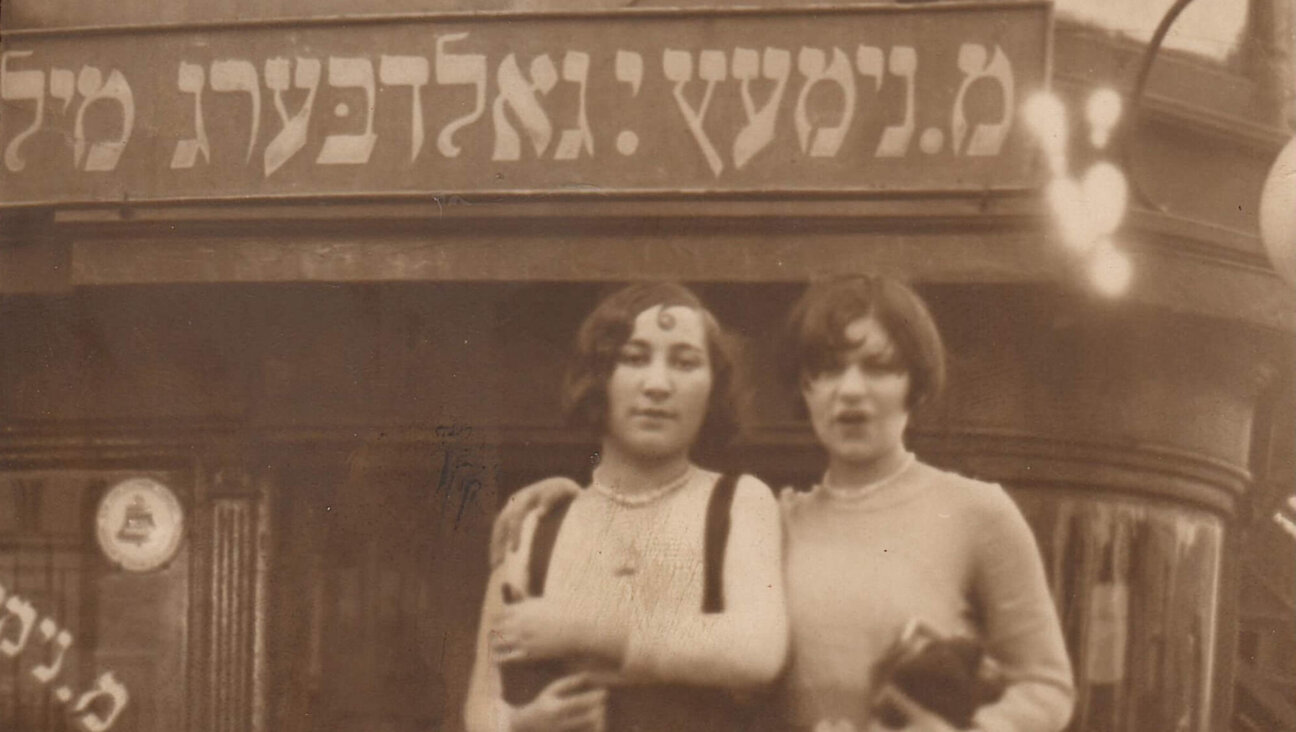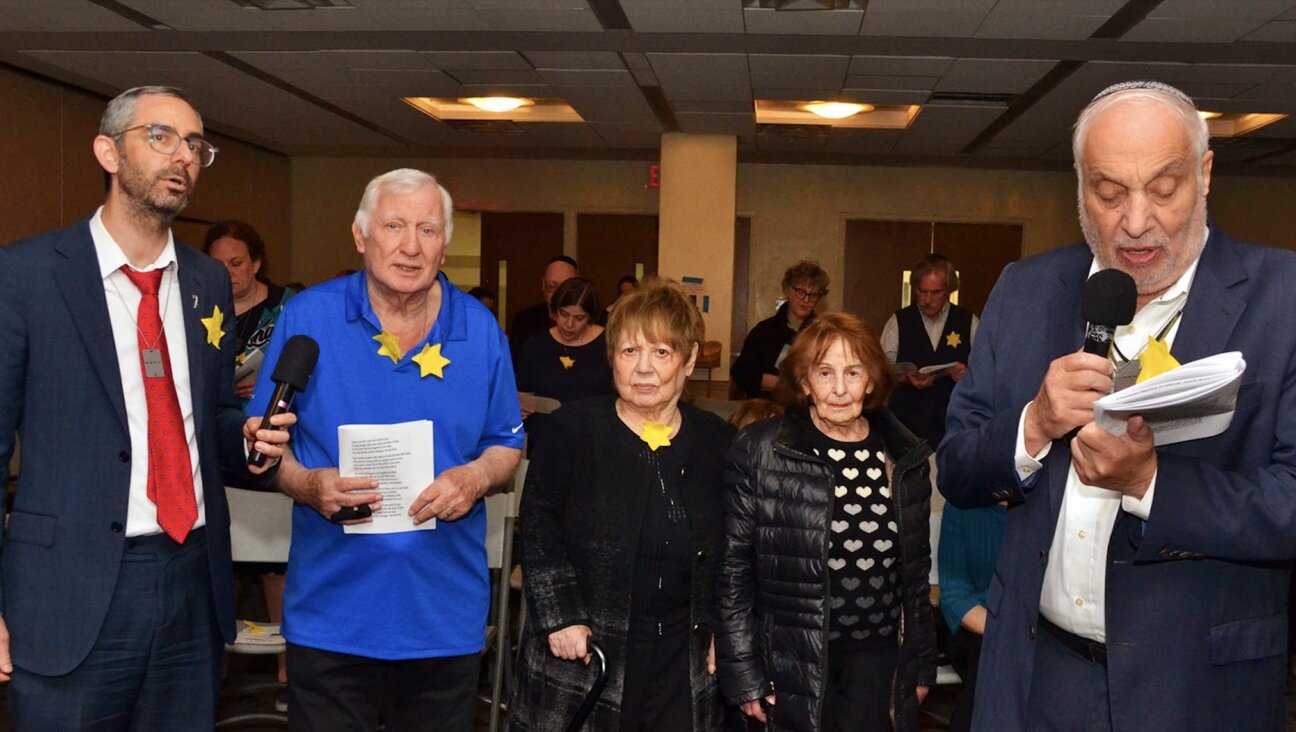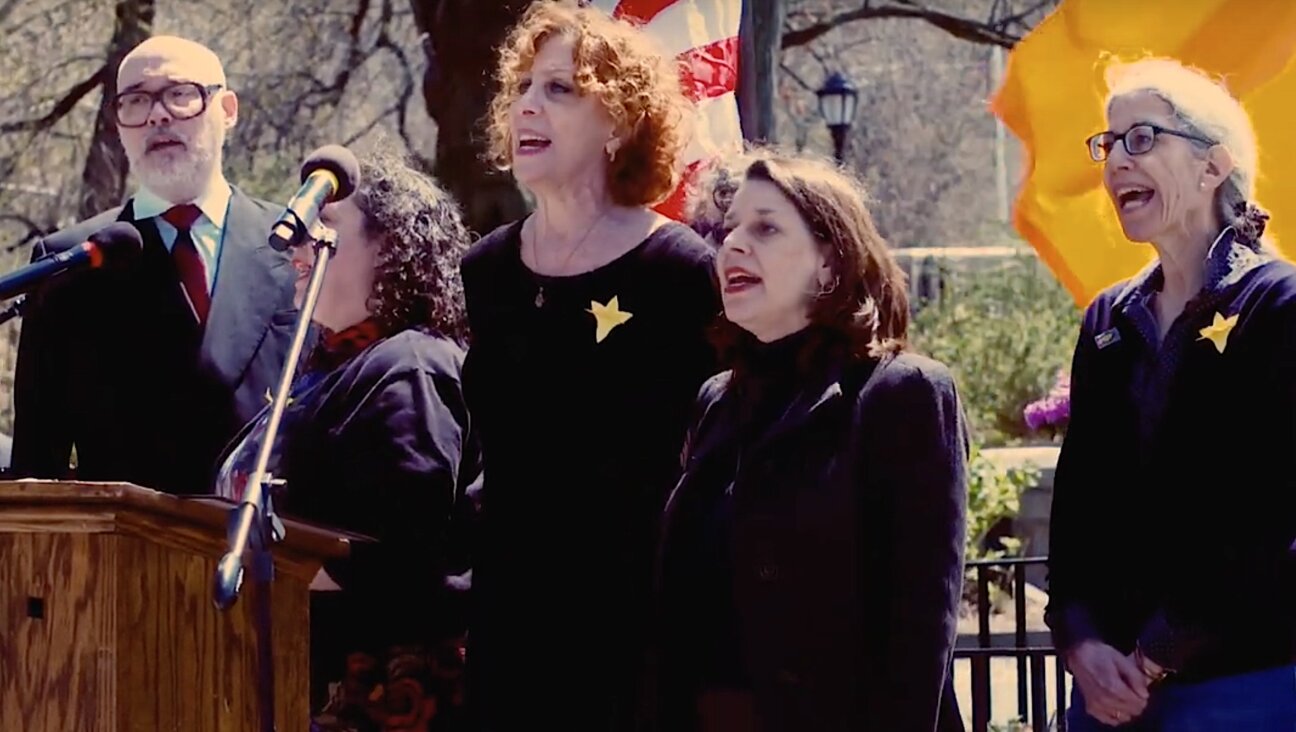Giving my son a bris, even though my father wouldn’t have approved
Knowing how religion could separate people made my father find all faiths ridiculous at best, evil at worst.

Courtesy of Kyla Kupferstein Torres
When Naftali was born, I knew that I wanted to have him circumcised. I’m Jewish. My husband Juan, who isn’t from the tribe, was circumcised and it makes sense for a father and son to match, doesn’t it?
Juan was hesitant, but not opposed. He had a few questions. I didn’t have any answers, other than I want my son to be Jewish, in a way that I have never been. It’s my father that was Jewish, not my mother. So even though I was raised in New York City, in a family of survivors, heard Yiddish daily, observed the high holidays, and have a long Jewish last name, there are many who wouldn’t consider me really Jewish.
Juan and I were brand new parents, with this wrinkly little guy lying between us on the bed. We called Cantor Philip Sherman, the mohel that our friends used for their own son. He asked about our backgrounds and faiths and that’s when I tensed up. I worried that he wouldn’t agree to perform a bris for my son, but Cantor Sherman surprised me.
“Whatever the halakha says, Naftali is descended from Jews,” he said. “If he one day wants to choose a truly Jewish life” (as I have not, he pointed out), “having had a religious bris will be a good thing. The rabbis will give him brownie points,” he said. If one day he converts to clear up the pesky question of his status (as I have not) they won’t require a re-enactment, the pricking of the penis for a drop of blood that is required of converts. Juan raised his eyebrows to me, and I read his face as a what do you think?
“Yeah,” I told the mohel, “we’ll do that.”
Before Juan and I even made up our minds to become parents, his sister had asked him to be godfather to her son. She’d had to leave the Catholic Church when she married Mike, who was Jewish, since the Catholic church doesn’t perform marriage ceremonies for interfaith couples. On the day of Max’s christening, I sat through the service, feeling comfortable enough. I’ve always liked religious services, of any kind really, since no one in my childhood ever forced me to attend one.
My grandparents were devout atheists because of their allegiance to the Jewish Labor Bund. My father took it a step further, perhaps because during his preschool years his family returned to Warsaw to search for relatives who had all been exterminated, aunts and uncles and cousins he would never know. Knowing how religion could separate people made him find all faiths ridiculous at best, evil at worst. He couldn’t sit still in any house of worship, even a synagogue.
But I didn’t inherit his contempt. At Debbie’s Episcopalian church there was even a hymn that was based on a Jewish prayer which allowed me to feel almost at home. Maybe someday I would be able to christen a child of mine, make my mother-in-law happy in a way that my Christian grandmother never was with me and my brother, who had been raised without religion. That I even considered it made me feel generous, virtuous, even a little self-congratulating.
But then, the inevitable moment came. I can’t imagine how I didn’t anticipate it. I’d seen “The Godfather” a dozen times, watching Michael Corleone pledge his faith at his nephew’s baptism as he had the heads of the Five Families killed. I knew, intellectually, what the service would entail.
Juan held the baby, and the priest led him in repeating the words that turned my stomach to think of anyone saying over a child of mine: that Max was marked as Christ’s own forever. I listened to my husband as he followed the Father’s instructions to say that he, on Max’s behalf, renounced Satan, his evil powers, and sinful desires. It felt literal, like Max was being snatched to a world where his Jewish father and I would not be admitted. We were not Christ’s, not now, nor would we ever be, nor did I want to be.
I knew then that as much as I might want to give Juan’s mother the peace of mind that all her nietos (grandchildren) were safe from Purgatory, I’d never be able to do it. I was a Jew, and any child I had would have to be too.
There were only a couple of days left before the mohel was coming and I got to work, quickly inviting family and friends. Each piece of the preparation felt significant. There were gauze pads and ointment to buy. There was food to be ordered — hummus and olives and babka and cocktail-sized Jamaican beef patties, and my favorite rugelach from Lee Lee’s Bakery in our Harlem neighborhood. We’d served the same Jewish dessert baked by a Black man at our marriage celebration; it seemed fitting to have it again for Naftali’s big day.
Many parents are terrified at the thought of their child being cut, but I had only one concern — not about how right it was to have this ceremony, not about safety or the mohel’s expertise. I was quietly freaking out, worried about my own ability to care for Naftali afterwards. There was no manual, just a very short “Aftercare Instructions” email from the mohel. I worried it might be easy to screw it up. And what if I messed up my son’s penis? I’d never be able to afford the therapy both of us would require, pretty much for the rest of our lives.
The day before the bris, Juan turned to me:
“Why did you say yes?”
“What?”
“Why did you say we’d do the whole thing, the religious ceremony?”
“What do you mean? You looked at me and I thought…”
“We didn’t even have a conversation.”
“Wait, are you changing your mind?”
He assured me that he wasn’t, but his face had a look of anguish, a last-minute panic of doubt that he did the right thing, agreeing to circumcision at all, let alone it being done ceremonially in our apartment, before friends and family.
“I’m sorry, it’s fine,” he said. “It’s important to you. But you’re gonna be on your own taking care of it after. I’m not gonna be able to look.”
We shared the same fear. It felt primal, this terror at the idea of harming our son’s penis. But with all the men I knew, I never encountered one who had a dick botched by a mohel or a resident. Naf would be fine. I was all in.
Once I was clear Juan didn’t want to turn back, I was back to work mode. In addition to preparing the apartment for so many guests, there was my part of fulfilling the mitzvah, aside from simply having the circumcision happen. It’s not just the mohel who takes part. Key to the ceremony is assigning roles to other participants: who will bring Naf into the room? Who will be the sandek, the one who holds him during the bris? It’s customary that it be the mother’s father, but my father was dead. To serve as sandek is an honor but I wondered: would my father have been willing to do it or would he have scoffed at me for entertaining the idea of a bris at all? I imagined that he’d accuse me of pandering to a deity, of putting on some sort of show.
My father never took part in any religious ritual. He insisted that my brother be circumcised at the hospital when he was born. Neither my brother nor I had a bar or bat mitzvah celebration when our friends did. When he died, my father chose to be cremated instead of buried in a Jewish cemetery.
My atheist grandparents always said of my father: “He gave a big speech!” when he turned 13 and finished folkshul (the Yiddish elementary school). There were proud photos of him from that day all over my grandparents’ apartment. No mention of any bar-mitzvah. And yet, when my father died, I found an invitation to “Leon’s Bar Mitzvah” among his photos and papers. And my brother and I did sit shiva for him.
I wrestled with this bris issue for days. Maybe my father would have been glad that I cared enough to ensure that his grandson was a Jew? In spite of the fact that he had married my mother, a Black woman, against his own parents’ wishes, he’d hinted, subtly, that he wanted me to marry a Jewish man. It wasn’t logical, but even in those first few days of being a mother I was beginning to understand that parenting is not always logical.
So I put aside the imaginary argument with my dad. I was the parent now and I got to decide. We chose my friend Zev, who I met the year after my father’s death. He was around the age my father would have been had he lived, and he had become a bit of a surrogate father to me. We’d already begun to call him Zeyde.
Zev was indeed honored to serve as our sandek, and though he wasn’t religious either, he brought a tallis (a prayer shawl) for Naf. I held its velvet bag, stroked the gold embroidery, and wondered if my son would ever use it. I supposed that, like the bris, it would be there if he needed it.
I was surprised when I saw Juan’s Catholic parents arrive; I didn’t think he would have invited them. They were there out of respect, but were completely bewildered. My father-in-law, Tilo, started chatting in his broken English with my father’s oldest friend, Menachem (or as we knew him, Mike) Fox, who spoke a broken Spanish.
We assigned Mike the honor of sitting in the Chair of Elijah, welcoming Naftali to the ceremony. Tilo moved the pillow from the chair next to Mike so he could have a seat, but Mike stopped him, explaining that that was the pillow upon which the mohel was going to rest Naf when he made the cut. I watched Tilo retreat abruptly to a chair across the room, as close to the door as possible.
Even before the ceremony began, Juan and his father were holding themselves in exactly the same way — one arm folded anxiously across their chests, the other hand under their chins, propping up a grimace. My mother-in-law paced slightly, and every few minutes she came over to whisper a question to Juan, apparently hoping that by getting answers she’d be less nervous.
The fact that this was a religious event was her only comfort. She was a devout Catholic, but had deep respect for others’ religious traditions and means of connecting with God. I was grateful for her willingness to witness this day, especially when I knew that what I was doing with this bris was claiming Naftali for the Jews, and that her grandson would never belong to Jesus as I’m sure she desperately wished he could.
Our apartment had never seemed so small, though we’d had as many people over before. My Puerto Rican in-laws, my Jamaican cousins, my Jewish neighbors, my Israeli colleagues, my Indian, Black American, and Jewish friends lined the walls. My mother brought the baby into the room, and handed him to Mike, as the mohel began his spiel. Mike handed the baby over to Zeyde Zev, our sandek, who cradled Naf as the mohel prepared to do the deed.
Cantor Sherman explained that Naf wouldn’t feel pain, probably wouldn’t cry. I trusted him. My smile was straining my face. Reflexively, I took Juan’s hand to comfort him, but I didn’t absorb his distress. I knew my baby was probably a little woozy from the drops of wine we had him suck from a piece of gauze, as instructed, before the ceremony began. He was dozing by the time the mohel made the cut. Naf was quiet, just as we were told he would be. The only sounds were the soft gasps from the adults across the room.
Juan and I were instructed to say the bracha, the blessing, repeating after Cantor Sherman:
Barukh Atah Adonai Elohenu melekh ha-olam, asher kideshanu be- mitsvotav ve-tsivanu le-hakhniso bivrito shel Avraham ovinu. Blessed are You, Lord our God, king of the universe, who has sanctified us with His commandments and commanded us to enter Naftali into the covenant of Avraham our forefather.
I recited the words, knowing that my father would never have approved. But you know what? I felt him standing next to me all the same.
A message from our Publisher & CEO Rachel Fishman Feddersen

I hope you appreciated this article. Before you go, I’d like to ask you to please support the Forward’s award-winning, nonprofit journalism during this critical time.
At a time when other newsrooms are closing or cutting back, the Forward has removed its paywall and invested additional resources to report on the ground from Israel and around the U.S. on the impact of the war, rising antisemitism and polarized discourse.
Readers like you make it all possible. Support our work by becoming a Forward Member and connect with our journalism and your community.
— Rachel Fishman Feddersen, Publisher and CEO






















